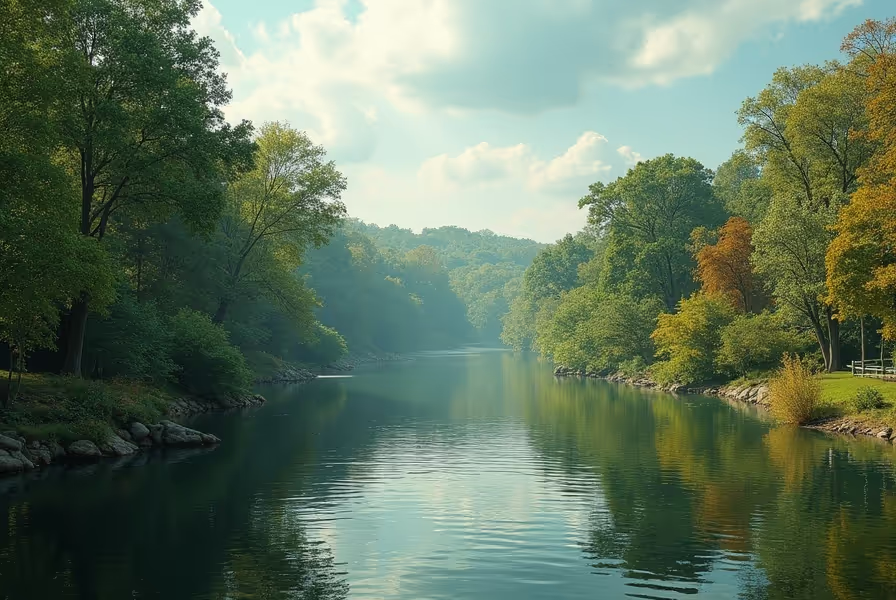The Origin of New Jersey’s Nickname
New Jersey is famously known as the "Garden State." But have you ever wondered why it's called that? The name may surprise you, especially if your idea of New Jersey is shaped by highways and suburban sprawl. Take a deeper look and you’ll find a land rich in farming history, produce production, and agricultural innovation.
Let’s explore how New Jersey got its green nickname, what it really means, and how its landscape and heritage support it.
Why Is New Jersey Known as the Garden State?
The nickname "Garden State" reflects New Jersey’s deep agricultural roots. Long before shopping malls and high-rises dotted the skyline, this land was intensely productive. Colonists and farmers saw New Jersey as a rich area for growing food. Its fertile soil, moderate climate, and accessibility to markets in nearby New York City and Philadelphia made it a key agricultural state.
Today, even though New Jersey is one of the most densely populated states, it still produces an abundance of fresh fruits and vegetables.
History Behind the “Garden State” Nickname
The name “Garden State” reportedly dates back to the 19th century. The most widely accepted origin comes from Abraham Browning, a Camden-based attorney and former New Jersey Attorney General.
In 1876, Browning gave a speech during the Centennial Exhibition in Philadelphia. He described New Jersey as a giant barrel, open at both ends—its contents being tapped by neighbors New York and Philadelphia. Despite this metaphor, he praised the state's rich farmlands and bountiful harvests, summarizing it all by calling New Jersey the “Garden State.”
The phrase stuck. In 1954, New Jersey officially adopted “Garden State” as its nickname and began using it on license plates, thanks to legislation driven by popular demand.
New Jersey’s Agricultural Heritage and Products
The state’s nickname is more than symbolic—it represents a strong agricultural sector. While it might not be the largest producer, the quality and diversity of crops grown here are remarkable. You'll find fresh vegetables, fruits, herbs, and even wine produced across New Jersey's farmlands.
Top crops and agricultural products include:
- Tomatoes – often dubbed as some of the best-tasting in the U.S.
- Blueberries – New Jersey ranks among the top producers nationwide.
- Peaches – The state is famous for sweet, juicy peaches from its orchards.
- Corn – Sweet corn in the summer is a local favorite.
- Bell peppers, cranberries, and spinach – All grown in abundance.
With over 700,000 acres of farmland, more than 9,000 farms, and access to nearby urban centers, New Jersey agriculture continues to thrive.
Does New Jersey Still Live Up to Its Name?
Despite development, the Garden State lives up to its identity. New Jersey supports local farms through markets, farm-to-table movements, and agricultural education. Urban farming has also taken root in cities like Newark and Camden, making local produce more accessible.
You’ll see farms selling fresh eggs, produce, and flowers just a short drive from major cities. Community-supported agriculture (CSA) programs and farmers markets also promote sustainable food systems and keep farming alive in the state.
Fun Facts About New Jersey’s Nickname and Food
- It was the first state to introduce a blueberry as its official state fruit.
- The Cranberry Festival in Chatsworth celebrates the local cranberry harvest each fall.
- Tomato pies originated in Trenton—different from pizza, with cheese beneath the sauce.
- Rutgers University plays a major role in agricultural research and innovation.
These fun facts show how deeply farming, food, and local identity tie into the “Garden State” nickname.
How Geography Supports Farming in New Jersey
New Jersey’s diverse terrain—coastal plains, river valleys, and rich topsoil—helps its varied agriculture. The central and southern regions have sandy soils ideal for growing a range of crops. These areas also enjoy a longer growing season due to the mild ocean-influenced climate.
Its strategic location between New York City and Philadelphia ensures that farmers have direct access to urban consumers. This proximity encourages more localized, sustainable farming practices.
Frequently Asked Questions About the Garden State
Why is New Jersey referred to as the Garden State?
New Jersey earned the nickname “Garden State” due to its fertile soil and long-standing history of agriculture. Despite being a small and densely populated state, it has consistently produced a variety of fruits, vegetables, and other crops for centuries.
When did New Jersey start using the nickname Garden State officially?
The nickname became official in 1954 when it was added to state license plates. The decision followed strong public support, recognizing New Jersey's farm legacy and crop production.
What are the main crops grown in New Jersey?
New Jersey’s leading crops include tomatoes, blueberries, sweet corn, peaches, pumpkins, and bell peppers. The climate and soil make it ideal for many different types of fresh produce.
Is New Jersey still known for farming today?
Yes. Despite urbanization, more than 9,000 farms continue to operate in New Jersey. Farmers markets, local CSAs, and sustainable practices keep agriculture a vital part of the state’s economy and identity.
The Garden State in Pop Culture and Identity
The “Garden State” doesn’t just describe agriculture. It represents pride, work ethic, and local food culture. The nickname has appeared in movies, music, and literature. The 2004 film Garden State helped popularize it for a younger generation. Local food festivals, gardening groups, and seasonal markets further embrace the name as a badge of identity.
For New Jerseyans, the Garden State is more than fertile land—it's a part of everyday life.











.svg)



